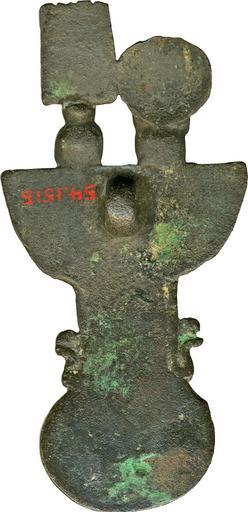MAKE A MEME
View Large Image

| View Original: | Egyptian_-_Menat_with_the_Heads_of_the_Deities_Shu_and_Tefnut_-_Walters_541515_-_Reverse.jpg (872x1800) | |||
| Download: | Original | Medium | Small | Thumb |
| Courtesy of: | commons.wikimedia.org | More Like This | ||
| Keywords: Egyptian - Menat with the Heads of the Deities Shu and Tefnut - Walters 541515 - Reverse.jpg In rituals for the gods special instruments were used by priests and priestesses to invoke the deities or to perform rituals before them One of the most important instruments was the Menat a counterweight that held elaborate beaded collars in place used also as a noise-making ritual instrument by rattling the collar's beads The representation of a broad collar called an Usekh also called an Aegis originally a Greek term for shield surmounted with the head of a deity functioned as a protective symbol This combination of the Menat and Usekh is surmounted by the heads of the divine couple Shu god of the air and Tefnut goddess of moisture and corrosive air They were the first emanations of the primeval god Atum when he created the world The Menat is flanked by cobra serpents; the upper part displays the squatting figure of the ram-headed sun god while the lower part displays an oxyrhynchus fish in a papyrus thicket between 664 380 BC Late Period bronze cm 11 3 5 66 0 94 accession number 54 1515 32265 Sheik of the Pyramids Henry Walters city Baltimore Walters Art Museum Henry Walters Acquired by Henry Walters 1930 Daily Magic in Ancient Egypt The Walters Art Museum Baltimore 2006-2007 place of origin Egypt Walters Art Museum license Ancient Egyptian art in the Walters Art Museum Works of the Egyptian late period Shu Tefnut Menat-necklace and counterpoise | ||||